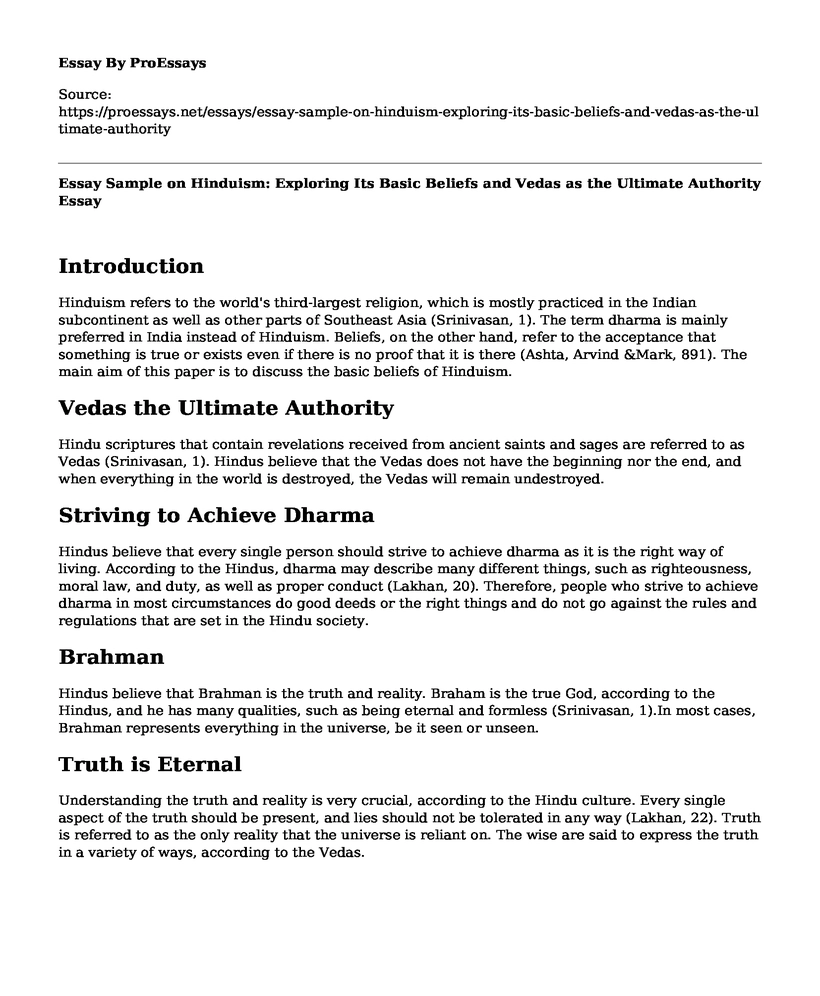Introduction
Hinduism refers to the world's third-largest religion, which is mostly practiced in the Indian subcontinent as well as other parts of Southeast Asia (Srinivasan, 1). The term dharma is mainly preferred in India instead of Hinduism. Beliefs, on the other hand, refer to the acceptance that something is true or exists even if there is no proof that it is there (Ashta, Arvind &Mark, 891). The main aim of this paper is to discuss the basic beliefs of Hinduism.
Vedas the Ultimate Authority
Hindu scriptures that contain revelations received from ancient saints and sages are referred to as Vedas (Srinivasan, 1). Hindus believe that the Vedas does not have the beginning nor the end, and when everything in the world is destroyed, the Vedas will remain undestroyed.
Striving to Achieve Dharma
Hindus believe that every single person should strive to achieve dharma as it is the right way of living. According to the Hindus, dharma may describe many different things, such as righteousness, moral law, and duty, as well as proper conduct (Lakhan, 20). Therefore, people who strive to achieve dharma in most circumstances do good deeds or the right things and do not go against the rules and regulations that are set in the Hindu society.
Brahman
Hindus believe that Brahman is the truth and reality. Braham is the true God, according to the Hindus, and he has many qualities, such as being eternal and formless (Srinivasan, 1).In most cases, Brahman represents everything in the universe, be it seen or unseen.
Truth is Eternal
Understanding the truth and reality is very crucial, according to the Hindu culture. Every single aspect of the truth should be present, and lies should not be tolerated in any way (Lakhan, 22). Truth is referred to as the only reality that the universe is reliant on. The wise are said to express the truth in a variety of ways, according to the Vedas.
Immortality of Individual Souls
The soul is known as the atman by the Hindus. It is seen as immortal, meaning that it cannot be created nor destroyed (Ashta, Arvind &Mark, 899). The soul will, therefore, always be there, be it in one body or universe to the next one. If a soul commits evil deeds when it is residing in a specific body, it must receive the consequences of those deeds when it enters the next life.
In most cases, it is the same soul that is present in a different body when it is receiving the punishment of the actions it committed. Transmigration is the process which the soul takes when moving from one body to another (Ashta, Arvind &Mark, 899). Karma, which is the actions of previous lives, determines the kind of body that the soul will take when it moves to the next life, and this shows that every action that is made in life has either a consequence or reward afterward.
The Goal of the Individual Soul Is Moksha
The release of the soul in the cycle of death and its rebirth is referred to as Moksha. This is the process where it unites with Brahman (true God), and therefore its true nature is realized (Srinivasan, 1). This realization and unity with Brahman can be undertaken through several paths, which include the path of devotion, duty as well as that of knowledge. This shows the ultimate surrender to God, who is their supreme leader.
Conclusion
Hindus have been seen to have many beliefs that they follow very strictly. These beliefs have been well discussed, and they include the belief in Vedas, dharma, Brahman, truth as well as the immortality of the soul. They have also been seen to emphasize that the goal of the individual soul is to surrender to Brahman. The Hindus follow these beliefs strictly.
Works Cited
Ashta, Arvind, and Mark Hannam. "Hinduism and microcredit." Journal of Management Development 33.8/9 (2014): 891-904.
Lakhan, Shaheen E. "Hinduism: life and death." BMJ 337 (2008): 0809310.
Srinivasan, A. V. "Core Beliefs of Hindus." Dummies, 26 Mar. 2016, www.dummies.com/religion/hinduism/core-beliefs-of-hindus/.
Cite this page
Essay Sample on Hinduism: Exploring Its Basic Beliefs and Vedas as the Ultimate Authority. (2023, Apr 04). Retrieved from https://proessays.net/essays/essay-sample-on-hinduism-exploring-its-basic-beliefs-and-vedas-as-the-ultimate-authority
If you are the original author of this essay and no longer wish to have it published on the ProEssays website, please click below to request its removal:
- Religion Essay Example: Criticisms of Recognition of Mother Teresa as a Catholic Saint
- Experience in Saint Demetrios Greek Orthodox Church Essay
- Research Paper on God Existence
- Discussion Paper Example on Christian Spiritual Vision
- Essay on Sports Evangelism: Connecting Faith and Fans Worldwide
- Essay Sample on Hinduism: Exploring Its Basic Beliefs and Vedas as the Ultimate Authority
- Essay Example on Thomistic Realism: Knowing God in Creation







